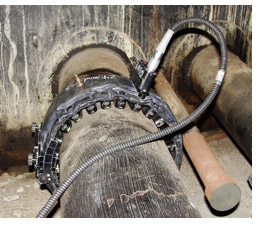| EPRI is coordinating research to develop and demonstrate nondestructive evaluation tools that can monitor plant components, provide early warning of potential degradation, and lower risks to groundwater.
In response to industry initiatives on groundwater protection and the integrity of underground piping and tanks, EPRI is coordinating research to develop and demonstrate nondestructive evaluation (NDE) tools to monitor plant components for corrosion and lower the risk for groundwater impact. Three reference documents form the basis for this research:
- Buried Pipe Guided Wave Examination Reference Document (1019115). This document provides utility personnel with basic information, limitations and guidance on how to implement a successful guided wave program.
- Nondestructive Evaluation: Buried Pipe NDE Reference Guide (1021626). This reference provides utility personnel with an overview of available NDE technology to examine buried pipe.
- Nondestructive Evaluation: Remote Field Technology Assessment for Piping Inspection Including Buried and Limited Access Components (1021153). This document provides guidance on tank inspection technology.
Many of the NDE technologies identified in the Buried Pipe NDE Reference Guide lack demonstrated performance capabilities or require additional development for use in the nuclear industry. Because of pressing industry inspection needs, EPRI accelerated its assessment of the more promising buried pipe NDE technologies, and is in the process of building assessment and development mock-ups. Where appropriate, EPRI is also providing seed money to initiate new technology development. Industry field trials will be critical since many of the promising NDE technologies are being adapted from other industries. EPRI has contacted vendors interested in participating in field trials, and nuclear plant sites are needed to host these trials.
 The expected broad use of guided wave technology for buried piping inspection highlights the importance of accurate analysis and interpretation of inspection results. EPRI offers a guided wave seminar to utility and vendor personnel to provide hands-on training of guided wave concepts, its application, and inspection interpretation. To further improve the reliability of guided wave examinations, EPRI is compiling a database of lessons learned and training of data analysts. A planned new project for improving reliability will standardize guided wave procedures by determining essential parameters and variables and what the procedures should address. The expected broad use of guided wave technology for buried piping inspection highlights the importance of accurate analysis and interpretation of inspection results. EPRI offers a guided wave seminar to utility and vendor personnel to provide hands-on training of guided wave concepts, its application, and inspection interpretation. To further improve the reliability of guided wave examinations, EPRI is compiling a database of lessons learned and training of data analysts. A planned new project for improving reliability will standardize guided wave procedures by determining essential parameters and variables and what the procedures should address.
Another project planned for 2011 will evaluate how to minimize the need for excavations in guided wave examinations. This project will assess the viability of permanently installed guided wave sensors, in which a hole is dug to mount the sensors and subsequent testing is done by connecting to a cable protruding from the sensor through the ground.
Specific to groundwater protection, EPRI is investigating NDE technologies to identify leaks in stainless steel liners of spent fuel pools, refueling pools, and transfer canals in dry and submerged conditions. Long range guided wave ultrasonic, eddy current, alternating current field measurement, and phased array techniques are some of the methods being investigated.
For more information, contact Steve Swilley at 704.595.2630 or sswilley@epri.com.
|